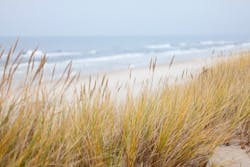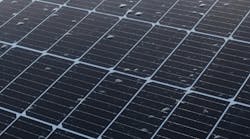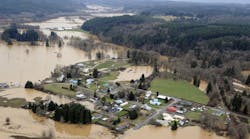Researchers Track How Coastal Storms Impact Groundwater Quality
University of Massachusetts Lowell researchers are looking at how severe coastal storms contribute to water pollution by measuring groundwater flow.
This will be done in an effort funded by a $784,000 grant from the National Science Foundation, reported the Lowell Sun.
The team is led by UMass Lowell’s James Heiss, assistant professor in the Department of Environmental, Earth and Atmospheric Science. The team is collaborating with UMass Lowell Computer Science professor Fred Martin to develop a sensor network.
The study will use computerized sensors installed at sites along the shoreline to measure groundwater flow to track how such storms may affect the amount of saltwater in beach aquifers.
Then, the team will analyze the effects of coastal storms on groundwater flow and the mixing patterns between seawater and fresh groundwater in beach aquifers.
Though scientists understand how tides and seasonal changes in rainfall influence groundwater flow, less is known about the effects of coastal storms. When sea level rises, coastal storms become more frequent and intense, with more seawater getting introduced into coastal aquifers.
“The response of beach aquifers to those interacting factors is not clear,” said Heiss in a press release. “This is what our research aims to find out. Large-scale intrusion of saltwater is a major problem in many coastal communities and large cities that rely on groundwater as a source of drinking water. In beach aquifers, the increasing salinity will also likely influence the aquifers’ ability to remove pollutants before flowing into the ocean.”
Researchers from Woods Hole Oceanographic Institution are working with UMass Lowell on the study, according to the press release.
“Excess nitrogen in coastal waters can cause algal blooms, mass die-offs of fish and loss of biodiversity, which can impact the environment and coastal economies,” Heiss said in the release. “Red tides, blue-green algae and cyanobacteria release toxins that can be harmful to humans, pets, fish, shellfish, marine mammals and birds.”
The experiments will be conducted at the U.S. Army Corps of Engineers Field Research Facility in Duck, North Carolina, which has dedicated beach access featuring a long research pier extending from the dune line into the Atlantic Ocean. Researchers will install a network of sensors in monitoring wells on the beach next summer before hurricane season.
UMass Lowell students contributing to the project include: computer science majors Sam Patriquin, of Chelmsford; John Swanson, of Westford; Zachary McCann, of Arlington; Charlie Mirabile and Joel Savitz, of Newton; and mechanical engineering major Eric Viscione, of Westford. Environmental science major Kristopher Leary, of Andover, who graduated in May, also participated.


